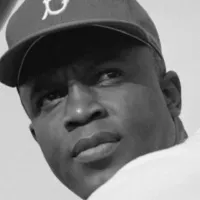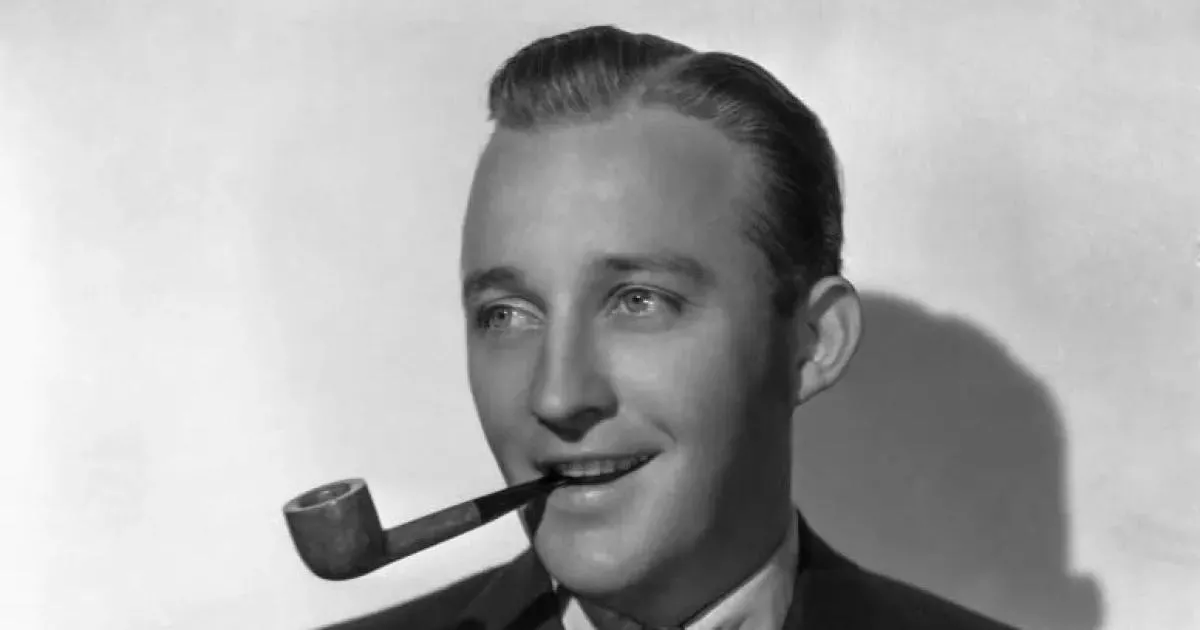Bing Crosby, born Harry Lillis Crosby Jr., was a multi-talented American entertainer and businessman. A pioneering multimedia star, he achieved global recognition for his singing, acting, and broadcasting throughout a five-decade career. From 1926 to 1977, he consistently topped charts and dominated box offices, establishing himself as a leading figure in 20th-century entertainment. His extensive filmography includes over 70 movies, and his discography boasts over 1,600 recorded songs, showcasing his significant influence on music and popular culture.
May 3, 1903: Birth of Bing Crosby
On May 3, 1903, Harry Lillis "Bing" Crosby Jr. was born in Tacoma, Washington.
1910: The Bingville Bugle and the Birth of a Nickname
Around 1910, a neighbor named Valentine Hobart bestowed upon young Harry Lillis Crosby the nickname "Bingo from Bingville," inspired by a comic feature called "The Bingville Bugle" in a local newspaper. This nickname eventually evolved into the iconic "Bing."
1913: Crosby Family Moves to Spokane
In 1913, the Crosby family relocated to Spokane, Washington, where Bing's father constructed a home that would later become a museum dedicated to his son's life and career.
1917: Crosby's Early Exposure to Showmanship
At the age of 14, in 1917, Bing Crosby landed a summer job at Spokane's Auditorium, where he had the opportunity to observe various performers, including the renowned Al Jolson, whose energetic performances and improvisations left a lasting impact on the budding entertainer.
1920: Graduation and Gonzaga University Enrollment
Bing Crosby graduated from Gonzaga High School in 1920 and subsequently enrolled at Gonzaga University.
1923: Formation of the Musicaladers
In 1923, Bing Crosby joined forces with Al Rinker and several other musicians to form a band called the Musicaladers. They performed at various venues and even secured a spot on Spokane radio station KHQ.
October 1925: Crosby and Rinker Seek Fame in California
Driven by their ambition for success, Bing Crosby and Al Rinker set their sights on California in October 1925, hoping to make their mark in the entertainment industry. Their journey led them to Los Angeles, where they secured a 13-week engagement with the revue "The Syncopation Idea."
October 1926: Debut with Whiteman's Orchestra
In October 1926, Bing Crosby, as part of a duo with Al Rinker, recorded their first song, "I've Got the Girl" with Don Clark's Orchestra. This led to them being hired by the Paul Whiteman Orchestra, a significant step in Crosby's early career.
1926: Start of Crosby's Rise to Fame
Bing Crosby's early career began its ascent to stardom in 1926, marking the start of his influence in record sales, radio, and motion pictures.
1928: First Number One Hit
Bing Crosby achieved his first number one hit in 1928 with a jazz-infused rendition of "Ol' Man River".
1929: Encounter in Chicago
Bing Crosby had a significant, albeit accidental, encounter with individuals associated with the Mafia in Chicago in 1929, an event he recounted in his autobiography "Call Me Lucky."
1929: Film Debut with King of Jazz
The Rhythm Boys, Crosby's group at the time, appeared in the film "King of Jazz" with Paul Whiteman in 1929.
September 1930: Marriage to Dixie Lee
Bing Crosby married Dixie Lee in September 1930.
1930: Marriage to Dixie Lee
Bing Crosby married actress and nightclub singer Dixie Lee in 1930.
March 1931: Career Focus After Marital Issues
In March 1931, Crosby faced a threat of divorce from Dixie Lee, which led him to dedicate himself more seriously to his career.
August 8, 1931: "At Your Command" Tops the Charts
Bing Crosby's songwriting talent was evident on August 8, 1931, when his composition "At Your Command" reached the number one spot on the U.S. pop singles chart, where it remained for three weeks.
September 2, 1931: Nationwide Radio Debut
Bing Crosby's solo nationwide radio debut took place on September 2, 1931 with the launch of his show, "15 Minutes with Bing Crosby."
1931: Start of Recording Career
Bing Crosby began his recording career in 1931, marking the beginning of a highly successful journey in the music industry.
1931: Crosby Embarks on Solo Career
Bing Crosby began his solo music career in 1931, achieving popularity for his crooning style.
1931: Crosby's Chart Dominance Begins
Bing Crosby embarked on a remarkable run of chart success starting in 1931, consistently releasing charting singles year after year.
1931: Overcoming Alcohol Problem
Bing Crosby reportedly gained control of his alcohol problem in 1931 after facing legal issues related to drinking and a car crash during the Prohibition era.
1931: Top Selling Artist and Film Contract
In 1931, Bing Crosby had ten songs in the top 50 charts. His rising fame led him to sign with Paramount and star in his first full-length film, "The Big Broadcast" in 1932.
February 1932: Early Mention of Crosby's Nickname
As early as February 1932, the Associated Press had already made mention of Bing Crosby's nickname, solidifying its presence in his public persona.
1932: The Big Broadcast Release
Crosby's first full-length film, "The Big Broadcast," was released in 1932, marking the beginning of his successful film career.
1933: Birth of First Son
Bing Crosby's first son, Gary, was born in 1933.
1934: Commercial Success and Impact on the Record Industry
Bing Crosby secured his first commercial sponsorship for his radio show in 1934, further increasing his national fame. His popularity helped boost record sales during the Depression and his agreement to lower single prices while receiving royalties significantly impacted the recording industry.
1934: Signing with Decca Records
Bing Crosby signed a contract with Decca Records in late 1934.
1934: Birth of Twin Sons
Bing Crosby welcomed twin sons in 1934.
1934: Crosby's Box-Office Reign Begins
Bing Crosby's consistent presence among the top 10 box-office draws started in 1934, marking the beginning of his long reign in the film industry.
1934: Crosby Shifts to Clear Vocal Style
By 1934, urged by his manager Jack Kapp, Bing Crosby transitioned to a clearer vocal style, moving away from his earlier crooning.
1935: Crosby's Passion for Horse Racing
Bing Crosby, a longtime fan of horse racing, purchased his first racehorse in 1935.
1936: Advocating for Louis Armstrong in "Pennies from Heaven"
Bing Crosby advocated for Louis Armstrong's inclusion in the film "Pennies from Heaven" in 1936, challenging racial barriers in Hollywood and creating opportunities for African American performers.
1936: Kraft Music Hall Host
Bing Crosby took over as host of the "Kraft Music Hall" radio program on NBC in 1936, a position he held for a decade. He also established "Where the Blue of the Night (Meets the Gold of the Day)" as his theme song.
November 8, 1937: Origin of the Nickname "Bing"
On November 8, 1937, following a performance of "She Loves Me Not" on Lux Radio Theatre, actress Joan Blondell inquired about the origin of Bing Crosby's nickname, sparking a story that, while entertaining, wasn't entirely accurate.
1937: First Crosby Clambake
Bing Crosby hosted the inaugural "Crosby Clambake," a pro-am golf tournament, at Rancho Santa Fe Golf Club in California in 1937.
1937: Crosby's First Oscar Win and Box-Office Success
Bing Crosby won his first Academy Award for the song "Sweet Leilani" in 1937, a year when he was also among the top 10 box-office attractions.
1937: Honorary Doctorate from Gonzaga University
Bing Crosby's alma mater, Gonzaga University, bestowed upon him an honorary doctorate in 1937, recognizing his significant contributions to the entertainment industry.
August 12, 1938: Seabiscuit vs. Ligaroti Match Race
The Del Mar Thoroughbred Club hosted a significant match race on August 12, 1938, where Charles S. Howard's Seabiscuit defeated Binglin's horse, Ligaroti.
1938: The Mutual Network and Pre-recorded Programs
In 1938, The Mutual Network began pre-recording some of its programs, including "The Shadow" with Orson Welles.
1939: Crosby and the Andrews Sisters Begin Collaboration
Bing Crosby and the Andrews Sisters embarked on their first musical collaboration in 1939, marking the beginning of a successful partnership.
1939: Roaring Lion's Tribute Song
Calypso artist Roaring Lion released a tribute song dedicated to Bing Crosby in 1939. The song, titled "Bing Crosby," celebrated Crosby's heartfelt singing style and his ability to connect with audiences worldwide.
1939: Crosby's Prolific Year in Music
In 1939, Bing Crosby released an impressive 24 separate popular singles, highlighting a period of exceptional productivity and chart success.
1940: The Road to... Series Begins
Bing Crosby embarked on his first "Road to..." musical comedy film with Bob Hope and Dorothy Lamour in "Road to Singapore" in 1940.
1940: Start of the "Road to ..." Film Series
Bing Crosby embarked on his iconic "Road to ..." film series with Bob Hope in 1940, a collaboration that would span over two decades and produce several successful comedy films.
1940: Crosby Maintains Box-Office Prominence
In 1940, Bing Crosby continued his streak of box-office success, remaining among the top-grossing acts in the film industry.
January 1941: Marital Difficulties and Request for Divorce
Strained by his wife Dixie's ongoing struggles with alcohol, Bing Crosby requested a divorce in January 1941. However, he continued to grapple with the desire to be present for his children.
1941: Crosby Debuts "White Christmas"
Bing Crosby introduced the world to Irving Berlin's "White Christmas" during a Christmas Day radio broadcast in 1941.
1941: "Road to Zanzibar" Released
The second film in the "Road to..." series, "Road to Zanzibar," starring Bing Crosby, Bob Hope, and Dorothy Lamour, was released in 1941.
October 3, 1942: "White Christmas" Charts
Bing Crosby's "White Christmas" first entered the music charts on October 3, 1942.
1942: "White Christmas" Wins Oscar, Furthering Crosby's Legacy
Bing Crosby's recording of "White Christmas" won an Academy Award in 1942, cementing the song's place in holiday tradition and adding to Crosby's legacy.
1942: "Road to Morocco" Hits Theaters
Bing Crosby, Bob Hope, and Dorothy Lamour continued their comedic adventures with the release of "Road to Morocco" in 1942.
1943: ABC's Formation and Crosby's Recorded Show
ABC was formed in 1943 after the sale of the NBC Blue Network following an antitrust suit. The network broke tradition by offering Bing Crosby a deal to produce a pre-recorded show.
1943: Crosby's Consistent Box-Office Appeal Continues
Bing Crosby's popularity as a film star persisted in 1943, marking another year of his consistent presence among the top 10 box-office draws.
1943: Don Bingo's Victory at the Suburban Handicap
Binglin's horse, Don Bingo, won the Suburban Handicap at Belmont Park in 1943.
1943: Crosby and the Andrews Sisters Support War Efforts with Music
From 1943 onwards, Bing Crosby and the Andrews Sisters released patriotic hits, including "The Vict'ry Polka," boosting morale during World War II.
1944: Crosby's Triple Triumph: Box Office, Oscar Win, and "Going My Way"
1944 marked a pinnacle year for Bing Crosby as he achieved the top spot in box-office sales, won the Academy Award for Best Actor for "Going My Way," and saw his song "Swinging on a Star" win an Oscar.
1944: Founding of Ampex
Alexander M. Poniatoff founded Ampex in 1944, a company that would later play a pivotal role in developing magnetic tape recording technology.
1944: Crosby Earns the Nickname "Der Bingle"
American journalist Bob Musel coined the nickname "Der Bingle" for Bing Crosby in 1944, reflecting his popularity and recognition in Europe.
1944: Crosby Wins Academy Award
Bing Crosby received an Academy Award for Best Actor for his performance in the film "Going My Way" in 1944.
1944: Academy Award for Going My Way
Bing Crosby won the Academy Award for Best Actor for his role in the film "Going My Way" in 1944.
June 18, 1945: Life Magazine Feature: "America's Number One Star"
On June 18, 1945, Life magazine featured Bing Crosby, calling him "America's number one star" and highlighting his unprecedented success in entertainment. The article emphasized his record-breaking sales, influence on the music industry, and status as a symbol of America.
December 1945: Crosby's Relationship with Joan Caulfield
A diary kept by two sisters, Violet and Mary Barsa, revealed that Bing Crosby was romantically involved with actress Joan Caulfield in December 1945. The diary documented their outings to dinners, theaters, and opera houses.
December 1945: Crosby Confides in Cardinal Spellman
Bing Crosby, grappling with his wife's alcoholism and his love for Joan Caulfield, sought guidance from Cardinal Francis Spellman in December 1945 or January 1946, expressing his desire for a divorce.
1945: Extramarital Affair Begins
Bing Crosby engaged in a confirmed extramarital affair during his marriage to Dixie Lee. This affair commenced in 1945 and lasted until the late 1940s.
1945: Academy Award Nomination for Crosby
Bing Crosby was nominated for an Academy Award for his role in the sequel to "Going My Way," titled "The Bells of St. Mary's," in 1945.
1945: "White Christmas" Reclaims Number One
Bing Crosby's "White Christmas" once again reached the top of the music charts in 1945.
1945: Crosby's Push for Pre-Recording Sparks Change in Radio
Bing Crosby's demand for pre-recorded radio shows in 1945 challenged industry norms and ultimately led to the adoption of magnetic tape recording.
1945: Crosby's Standoff with NBC over Pre-Recording
Bing Crosby's insistence on pre-recording his radio shows in 1945 resulted in a seven-month absence from the airwaves due to conflicts with NBC and his sponsor.
1945: Academy Award Nomination for The Bells of St. Mary's
In 1945, Crosby received an Academy Award nomination for his role in "The Bells of St. Mary's," making him one of the first actors to be nominated twice for portraying the same character.
1945: Crosby and the Andrews Sisters Continue to Uplift with Music
Until 1945, Bing Crosby and the Andrews Sisters continued to release uplifting songs like "Is You Is or Is You Ain't (Ma' Baby?)", contributing to the wartime spirit.
January 1946: Crosby's Decision to Stay with Dixie
After confiding in Cardinal Spellman and facing his mother's disapproval, Bing Crosby made the difficult decision to end his relationship with Joan Caulfield and remain married to Dixie Lee. He continued his efforts to support Dixie in overcoming her alcohol addiction.
January 1946: Crosby and Caulfield's Continued Relationship
Bing Crosby's relationship with Joan Caulfield continued into January 1946, according to the Barsa sisters' diary entries.
1946: "Road to Utopia" Released
1946 saw the release of "Road to Utopia," the fourth film in the popular "Road to..." series starring Bing Crosby, Bob Hope, and Dorothy Lamour.
1946: Crosby Becomes a Part Owner of the Pittsburgh Pirates
Bing Crosby became a part-owner of the Pittsburgh Pirates in 1946, a testament to his passion for baseball.
1946: Box Office Domination
Bing Crosby enjoyed a year of exceptional box office success in 1946, with three of his films, "The Bells of St. Mary's," "Blue Skies," and "Road to Utopia," ranking among the top five highest-grossing movies of the year.
1946: Crosby Returns to Radio After Dispute
Bing Crosby returned to radio broadcasting in the 1945–1946 season after resolving a legal dispute with his sponsor, marking a return to a prominent platform.
January 1947: "White Christmas" Tops Charts Again
Bing Crosby's "White Christmas" hit number one on the music charts for a third time in January 1947.
June 1947: Introduction to the Magnetophon
Murdo MacKenzie of Bing Crosby Enterprises saw a demonstration of the German Magnetophon in June 1947. The Magnetophon, a magnetic tape recorder, was a groundbreaking technology that would revolutionize audio recording.
August 1947: Crosby Begins Recording with the Magnetophon
Bing Crosby started using the Magnetophon to record his show "Philco Radio Time" in August 1947. The technology allowed for editing, a significant advantage over live broadcasts.
1947: Crosby Clambake Moves to Pebble Beach
After a hiatus due to World War II, the Crosby Clambake golf tournament resumed in 1947, relocating to Pebble Beach, California, where it became a fixture.
1947: "Road to Rio" and "Variety Girl" Released
Bing Crosby had two films featuring Bob Hope release in 1947: "Road to Rio," another installment in the comedic series, and "Variety Girl," which featured extended scenes with both actors.
1947: Release of "Smash-Up: The Story of a Woman"
The film "Smash-Up: The Story of a Woman" was released in 1947, with rumors circulating that it drew inspiration from the life of Dixie Lee, Bing Crosby's wife.
1948: Crosby Concludes Five-Year Reign as Box-Office King
Bing Crosby concluded an impressive five-year streak as the top box-office draw in 1948, solidifying his status as one of the biggest film stars of his era.
1948: Crosby Invests in Ampex and the Second Season of Philco Shows
Bing Crosby invested $50,000 in Ampex in 1948, demonstrating his commitment to advancing recording technology. The second season of his "Philco" shows was recorded using Ampex's Model 200A and Scotch 111 tape.
1948: Fundraising for Bing Crosby Stadium Begins
Bing Crosby's philanthropic efforts were acknowledged in 1948 when fundraising commenced for the construction of Bing Crosby Stadium in Front Royal, Virginia. Crosby played a key role in supporting the project through fundraising and financial contributions.
1948: Crosby's Popularity Peaks
In 1948, Bing Crosby reached the zenith of his popularity, being named the "most admired man alive" by American polls, surpassing notable figures such as Jackie Robinson and Pope Pius XII. His recordings dominated the airwaves, taking up more than half of the time dedicated to recorded music on American radio.
1948: Crosby Invests in the Billings Mustangs
In 1948, Crosby joined several other Hollywood stars as an investor in the Billings Mustangs baseball club, further illustrating his love for the sport.
1948: Cruise with Joan Caulfield
Patricia Neal and Joan Caulfield embarked on a cruise to England together in 1948.
1949: Crosby Lends Voice to Disney Film
Bing Crosby lent his recognizable voice to Disney's animated film "The Adventures of Ichabod and Mr. Toad," providing narration and vocals for "The Legend of Sleepy Hollow" segment in 1949.
1950: Crosby Ventures into Television
Bing Crosby entered the world of television in 1950 with "The Fireside Theater," a series of 26-minute episodes filmed at Hal Roach Studios.
1950: William D. Richardson Award
Bing Crosby received the William D. Richardson award in 1950, recognizing his significant contributions to golf as a non-professional.
1950: Completion of Bing Crosby Stadium
Bing Crosby's generosity and dedication to the Bing Crosby Stadium project in Front Royal, Virginia, culminated in its completion in 1950. The stadium stands as a testament to his commitment to the community.
1950: Crosby's Influence on Tape Recording
Crosby's use of the Ampex tape recorder in his 1950 film "Mr. Music" showcased the technology to a wider audience. He also gave an Ampex recorder to Les Paul, leading to Paul's invention of multitrack recording.
1950: Crosby Explores Videotape and "The Fireside Theater"
In 1950, while continuing to fund videotape recorder development, Crosby began his first television production, "The Fireside Theater". Since videotape recording wasn't quite there yet, he filmed the series at Hal Roach Studios and syndicated the "telefilms" to individual stations.
1950: Development of the Videotape Recorder
John T. Mullin and Wayne R. Johnson began working on the development of a videotape recorder in 1950.
November 11, 1951: World's First Demonstration of Videotape Recording
On November 11, 1951, Bing Crosby Enterprises, under Crosby's leadership, gave the world's first demonstration of videotape recording in Los Angeles.
1951: Crosby's "In the Cool, Cool, Cool of the Evening" Wins Oscar
Bing Crosby's musical success continued in 1951 as "In the Cool, Cool, Cool of the Evening" won an Academy Award, showcasing his enduring talent and appeal.
1952: Crosby and the Andrews Sisters Conclude Collaboration
Bing Crosby and the Andrews Sisters concluded their musical partnership in 1952 after a fruitful period of collaborations that produced numerous hits.
1952: "Road to Bali" Premieres
Bing Crosby, Bob Hope, and Dorothy Lamour took their comedic act to Bali in the 1952 release of "Road to Bali".
1952: Death of Dixie Lee
Dixie Lee, Bing Crosby's first wife, passed away in 1952 due to ovarian cancer.
1952: Establishment of Dixie Lee's Trust
Following the death of his first wife, Dixie Lee, in 1952, a trust funded by her share of their community property was established to support their sons financially.
1952: Dixie Lee's Will and Community Property
Upon Dixie Lee's death in 1952, her will stipulated that her portion of the community property with Bing Crosby be placed in a trust for their sons. This became a point of legal contention later on.
1953: Dissolving the Binglin Stable Partnership
The Binglin Stable partnership, formed by Crosby and Lindsay Howard, ended in 1953 due to Crosby's need to liquidate assets for inheritance tax purposes.
1954: Crosby's Uninterrupted Chart Success
Bing Crosby maintained an unbroken streak of charting singles every year from 1931 to 1954, solidifying his position as a musical powerhouse.
1954: Crosby's Enduring Box-Office Success
Bing Crosby's box-office dominance continued in 1954, marking 15 years of consistently ranking among the top-grossing acts in the film industry.
1954: End of Paramount Contract
Bing Crosby's contract with Paramount was set to run until 1954, indicating the duration and success of his film career with the studio.
1954: "White Christmas" Achieves Box-Office Success
Bing Crosby's film "White Christmas" enjoyed significant financial success upon its release in 1954, grossing $30 million, which would be equivalent to a substantial sum today.
1954: "White Christmas" Featured in Film
Bing Crosby's iconic recording of "White Christmas" was featured in his film "White Christmas" which was released in 1954.
1954: Crosby Acquires KCOP-TV
Bing Crosby's involvement in television broadcasting expanded in 1954 when he purchased KCOP-TV in Los Angeles, California.
1954: Caulfield's Admission of Relationship
Joan Caulfield admitted in 1954 to having been romantically involved with a married man who had children, but he ultimately chose his family over her.
1955: End of Decca Records Contract
Bing Crosby's contract with Decca Records was set to run until 1955, highlighting the long-term partnership between the artist and the record label.
1956: Crosby and Armstrong Collaborate on Film
Bing Crosby and Louis Armstrong, both having long and impactful careers in music, collaborated on the song "Now You Has Jazz" for the 1956 film "High Society."
1957: Marriage to Kathryn Grant
Bing Crosby married actress Kathryn Grant in 1957, who converted to Catholicism prior to their marriage.
1957: "White Christmas" Extends Crosby's Chart Streak
The annual re-release of Bing Crosby's iconic holiday song "White Christmas" extended his streak of charting singles to 1957, showcasing its enduring popularity.
November 1958: Purchase of Rising River Ranch
Bing Crosby purchased the 1,350-acre Rising River Ranch in Cassel, California, in November 1958, after leasing a portion of it for several years.
1958: Son's Marriage to Pat Sheehan
Bing Crosby's son, Dennis, married model Pat Sheehan in 1958. Bing Crosby had previously been romantically linked to Sheehan.
1958: RIAA Establishes Gold Record Certification
The Recording Industry Association of America (RIAA) initiated its gold record certification program in 1958, recognizing significant achievements in record sales.
January 16, 1959: Mention in FBI Files
An FBI memorandum dated January 16, 1959, mentioned Bing Crosby in connection to an invitation received by Moe Dalitz, a figure associated with organized crime, to a hunting party at Crosby's former ranch in Elko, Nevada.
September 1, 1959: Purchase of KPTV
NAFI Corporation, in partnership with Crosby, purchased KPTV, a television station in Portland, Oregon, on September 1, 1959.
1960: Pittsburgh Pirates World Series Victory
Bing Crosby experienced the thrill of victory as co-owner of the Pittsburgh Pirates when the team clinched the World Series championship in 1960.
1960: "High Time" Released
Bing Crosby starred in "High Time," a collegiate comedy released in 1960, alongside Fabian Forte and Tuesday Weld.
1960: Crosby's Impressive Bass Range Showcased in "Dardanella"
Bing Crosby's recording of "Dardanella" with Louis Armstrong in 1960 highlighted his impressive bass range, reaching notes lower than typical opera basses.
1960: Crosby Misses Deciding Game of the World Series
Crosby, too nervous to watch the deciding Game 7 of the 1960 World Series, opted to listen to the radio broadcast in Paris.
1960: Crosby Honored as "First Citizen of Record Industry"
In recognition of his estimated 200 million records sold, Bing Crosby was honored as the "First Citizen of Record Industry" in 1960.
1960: Sale of KCOP
NAFI Corporation acquired KCOP from Crosby's group in 1960.
1961: Bing Crosby Productions Enters Medical Drama
Bing Crosby Productions launched its first medical drama, "Ben Casey," in 1961.
1962: Conclusion of the "Road to ..." Film Series
After a successful run spanning over two decades, Bing Crosby and Bob Hope concluded their beloved "Road to ..." film series in 1962.
1962: Final "Road" Film Released
Bing Crosby and Bob Hope's final installment in the long-running, successful "Road to..." film series, "The Road to Hong Kong," premiered in 1962.
1962: Crosby Receives Grammy Lifetime Achievement Award
Bing Crosby received the prestigious Grammy Lifetime Achievement Award in 1962, recognizing his outstanding contributions to the music industry.
1963: "Breaking Point" Premieres
Bing Crosby Productions launched the television series "Breaking Point" in 1963.
1963: Relocation to Hillsborough
Bing Crosby and his family moved to a ten-bedroom Tudor estate in Hillsborough, California, in 1963, seeking a quieter environment for raising their children away from the Hollywood spotlight.
1963: Grammy Global Achievement Award
Bing Crosby was honored with the inaugural Grammy Global Achievement Award in 1963, recognizing his significant contributions to the music industry.
1964: Bing Crosby Productions Launches Shows
Bing Crosby Productions, Crosby's production company, released "The Bing Crosby Show" and "Slattery's People" in 1964.
1965: New Series from Bing Crosby Productions
Bing Crosby Productions debuted two new television series in 1965: "Hogan's Heroes" and a continuation of "The Bing Crosby Show."
1965: Purchasing Lindsay Howard's Estate
Crosby purchased a 40-room estate in Hillsborough, California, from his close friend Lindsay C. Howard in 1965.
1965: Move to French Chateau-Style House
In 1965, Bing Crosby and his family relocated to a spacious 40-room French chateau-style residence on Jackling Drive. This house later became the backdrop for some of the family's appearances in Minute Maid orange juice television commercials.
1966: "Ben Casey" Ends; "Breaking Point" Debuts
Bing Crosby Productions saw the end of "Ben Casey" in 1966, the same year it premiered a new medical drama titled "Breaking Point."
1966: Fishing Trip with Lord Egremont
Bing Crosby, an avid fisherman, spent a week in 1966 as a guest of Lord Egremont in Cockermouth, England, fishing on the River Derwent. The trip was filmed for ABC's "The American Sportsman.
1971: End of "Hogan's Heroes"
Bing Crosby Productions' popular military comedy "Hogan's Heroes" aired its final episode in 1971.
1971: Pittsburgh Pirates' Second World Series Win under Crosby's Co-ownership
Bing Crosby celebrated another World Series triumph as co-owner of the Pittsburgh Pirates when they secured their second championship under his ownership in 1971.
1973: Establishment of Grammy Hall of Fame
The Grammy Hall of Fame was founded in 1973 by The Recording Academy to recognize and honor recordings of exceptional historical or qualitative significance that are at least 25 years old. As of the provided information, four of Bing Crosby's recordings have received this prestigious recognition.
1973: Guinness Book Recognizes Crosby's Record Sales
The Guinness Book reported that Bing Crosby had sold over 400 million records worldwide in 1973, marking a significant milestone in his career.
January 1974: Recovery from Fungal Infection
In January 1974, Bing Crosby faced a significant health challenge when he contracted a life-threatening fungal infection in his right lung. After a period of recovery, he gradually returned to performing, releasing new albums and undertaking concert tours.
1976: Mullin's Memoir
Jack Mullin, who played a crucial role in introducing Crosby to the Magnetophon, published his memoir in 1976, detailing the early days of experimental recording.
March 20, 1977: Stage Fall and Injury
On March 20, 1977, Bing Crosby suffered a serious fall into an orchestra pit after recording a CBS concert special, "Bing – 50th Anniversary Gala." The accident resulted in a ruptured disc in his back, necessitating a month-long hospitalization.
August 16, 1977: Final American Concert
Bing Crosby's final performance in the United States took place on August 16, 1977, at the Concord Pavilion in Concord, California. Notably, this concert occurred on the same day that Elvis Presley passed away.
September 1977: Crosby's Final Television Appearance
Bing Crosby's final television appearance was recorded in September 1977 for a Christmas special titled "Merrie Olde Christmas."
October 13, 1977: Final Golf Game and Song
On October 13, 1977, Bing Crosby enjoyed a round of golf at the La Moraleja Golf Course near Madrid, Spain. He played 18 holes with World Cup champion Manuel Piñero against club president César de Zulueta and Valentín Barrios. In good spirits, Crosby even sang "Strangers in the Night" for construction workers who recognized him.
October 14, 1977: Death of Bing Crosby
Bing Crosby passed away on October 14, 1977.
October 18, 1977: Funeral and Burial
Following a private funeral Mass at St. Paul the Apostle Catholic Church in Westwood, Los Angeles, Bing Crosby was laid to rest on October 18, 1977, at Holy Cross Cemetery in Culver City, California.
1977: Crosby Plans Final "Road" Film
Before his death in 1977, Bing Crosby had plans for one final "Road" film, which would reunite him with Bob Hope and Dorothy Lamour on a quest for the Fountain of Youth.
1977: Crosby's Record Sales Reach Half a Billion
Bing Crosby's global record sales reportedly reached 500 million by 1977, according to the Guinness Book, further solidifying his status as a musical icon.
1977: Support for Marijuana Legalization
During a televised interview with Barbara Walters in 1977, Bing Crosby expressed his belief that marijuana should be legalized, arguing that it would allow for better legal control over its distribution.
1977: Bing Crosby's Death and Estate Management
Following Bing Crosby's death in 1977, his remaining estate was transferred to a marital trust designated for his widow, Kathryn. HLC Properties, Ltd. was then established to oversee his business interests, including his right of publicity.
1977: Posthumous Release of "White Christmas"
Following Bing Crosby's death in 1977, his rendition of "White Christmas" was re-released, reaching the top 5 on the UK Singles Chart.
October 1978: Sale of Rising River Ranch to Clint Eastwood
Clint Eastwood, through his business manager Roy Kaufman, purchased Bing Crosby's former property, the Rising River Ranch, in October 1978 for $1.5 million.
1978: World Golf Hall of Fame Induction and Bob Jones Award
In 1978, Bing Crosby was honored with the Bob Jones Award for sportsmanship by the United States Golf Association and was inducted into the World Golf Hall of Fame.
1978: Crosby Ranked as Most Successful Musical Artist
In 1978, Bing Crosby was recognized as the most successful and best-selling musical artist, reflecting his enduring popularity and impact on the music industry.
1981: Nathaniel Crosby's U.S. Amateur Championship Win
Bing Crosby's son, Nathaniel, emerged victorious in the 1981 U.S. Amateur Championship, a prominent golf tournament.
1982: Crosby and Bowie Duet Released
A duet of "The Little Drummer Boy" and "Peace on Earth," recorded by Bing Crosby and David Bowie for Crosby's 1977 Christmas special, was released as a single in 1982, becoming a posthumous hit for Crosby.
1983: Publication of Gary Crosby's Memoir
In 1983, Gary Crosby, Bing Crosby's eldest son from his first marriage, released his memoir "Going My Own Way." The book painted a critical portrait of Bing Crosby, alleging instances of cruelty, coldness, and abusive behavior. However, Gary's siblings reportedly distanced themselves from these claims.
1985: Henry Pleasants Analyzes Crosby's Vocal Range
In 1985, music critic Henry Pleasants compared Bing Crosby's vocal range throughout his career, noting its evolution from a baritone to a bass over the years.
1988: Patricia Neal's Autobiography Published
Actress Patricia Neal, who had an affair with Gary Cooper while he was married, revealed details about a 1948 cruise to England with Joan Caulfield, hinting at Caulfield's relationship with a married man, in her autobiography "As I Am," published in 1988.
December 1989: Dissolution of Dixie Lee's Trust
Bing Crosby's first wife, Dixie Lee, had established a trust in 1952, designed to provide for their sons after her death. However, this trust, heavily invested in oil stocks, collapsed in December 1989 due to the economic downturn in the oil industry.
1989: Denise Crosby's Role in "Pet Sematary"
Denise Crosby, the daughter of Bing Crosby's son Dennis, gained recognition in 1989 for her role in the film adaptation of Stephen King's horror novel, "Pet Sematary."
1989: Death of Lindsay Crosby
Tragically, in 1989, Bing Crosby's son, Lindsay Crosby, passed away at the age of 51. His death was a result of a self-inflicted gunshot wound.
1990: Bob Hope's Tribute in "Don't Shoot, It's Only Me!"
In his 1990 autobiography, "Don't Shoot, It's Only Me!," comedian Bob Hope fondly remembered his close friend Bing Crosby, expressing his enduring admiration for Crosby's exceptional voice and the impact he made on the world of entertainment.
1991: Death of Dennis Crosby
In 1991, Bing Crosby's son, Dennis Crosby, died by suicide at the age of 56. His death, like his brother Lindsay's, was attributed to a self-inflicted gunshot wound.
1992: Release of FBI Files
Bing Crosby's FBI files were made public in 1992, revealing little to no evidence of any ties to the Mafia.
1995: Death of Gary Crosby
Bing Crosby's son, Gary Crosby, passed away in 1995 at the age of 62 after battling lung cancer.
1996: Legal Dispute over Crosby's Estate
A legal dispute arose in 1996 when the trust established for Bing Crosby's sons from his first marriage initiated legal action against HLC Properties and Kathryn Crosby. They sought clarification on the trust's claim to income generated by Bing Crosby's community property.
December 1999: Allegations of Mafia Connections
In December 1999, the New York Post published an article alleging Bing Crosby's connections to the Mafia based on "recently published" FBI files, but these claims were discredited as the files had been public since 1992 and didn't support the allegations.
1999: Settlement in Estate Dispute
The legal battle over Bing Crosby's estate reached a settlement in 1999, with the trust representing his sons from his first marriage receiving approximately $1.5 million.
2000: Survey Ranks Crosby as Third Most Popular Actor of All Time
A 2000 survey declared Bing Crosby the third-most-popular actor of all time, with over 1 billion movie tickets sold, demonstrating his enduring legacy and impact on cinema.
2004: Death of Phillip Crosby
Phillip Crosby, one of Bing Crosby's sons, died of a heart attack in 2004. He was 69 years old.
2006: Publication of "Me and Uncle Bing"
Carolyn Schneider, Bing Crosby's niece, published her book "Me and Uncle Bing" in 2006. The book offers a positive and affectionate perspective on Bing Crosby's life and personality.
2006: Renaming of Metropolitan Theater to The Bing Crosby Theater
In 2006, the Metropolitan Theater of Performing Arts in Spokane, Washington, was renamed The Bing Crosby Theater in honor of the legendary entertainer. This gesture recognized Crosby's significant contributions to the world of music and entertainment.
October 14, 2007: Launch of Official Website
On the 30th anniversary of Bing Crosby's passing, October 14, 2007, his family launched an official website to commemorate his life and legacy.
2007: Crosby Inducted into Hit Parade Hall of Fame
In 2007, Bing Crosby was posthumously inducted into the Hit Parade Hall of Fame, celebrating his enduring popularity and influence on popular music.
2008: Western Music Hall of Fame Inducts Bing Crosby
Bing Crosby's musical legacy was further recognized in 2008 when he was inducted into the Western Music Hall of Fame.
December 2009: Discovery of the 1960 World Series Game 7 Recording
A recording of the 1960 World Series Game 7, which Crosby had arranged to be recorded, was found in his wine cellar in December 2009.
December 2010: Broadcast of the Restored 1960 World Series Game
The restored recording of the 1960 World Series Game 7, featuring Bill Mazeroski's game-winning home run, was shown on MLB Network in December 2010.
2010: Renewed Legal Challenge to Crosby's Estate
Despite the previous settlement, the trust established for Bing Crosby's sons from his first marriage filed another lawsuit in 2010. This time, they argued that Bing Crosby's right of publicity should be considered community property, and therefore, they were entitled to a portion of the income it generated.
2021: Sale of Hillsborough Estate
The Hillsborough, California, estate once owned by Bing Crosby was listed for sale in 2021 with an asking price of $13.75 million.
Mentioned in this timeline
CBS Broadcasting Inc CBS is a prominent American commercial broadcast...
California is a U S state on the Pacific Coast...

Elvis Presley the King of Rock and Roll was a...

The lion Panthera leo is a large cat species native...

David Bowie David Robert Jones was a highly influential English...

Jackie Robinson was an American professional baseball player who broke...
Trending
2 months ago Rome man arrested after shooting at car in Verona, New York.

3 months ago Alex Eala Enters Hong Kong Campaign with Career-High Ranking, World No. 51

8 months ago Pete Carroll envisions Jeanty & Mostert as 'Thunder and Lightning' in Raiders backfield.

Dave Bautista born David Michael Bautista Jr is an American actor and retired professional wrestler He achieved significant recognition during...

3 months ago Ben Shelton faces Kamil Majchrzak at ATP Basel after Rune's setback: Predictions.

6 months ago Ryan Reynolds Hints at Deadpool Joining Avengers in Cryptic Instagram Post
Popular

Thomas Douglas Homan is an American law enforcement officer who...

William Franklin Graham III commonly known as Franklin Graham is...

Jupiter is the fifth and largest planet from the Sun...

XXXTentacion born Jahseh Dwayne Ricardo Onfroy was a controversial yet...

Instagram is a photo and video-sharing social networking service owned...

Kristi Noem is an American politician who has served as...
